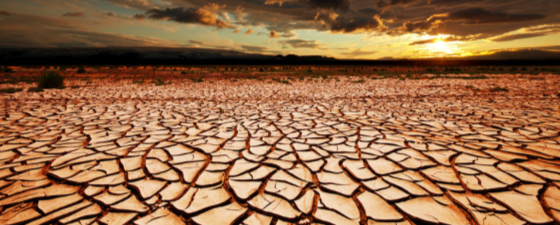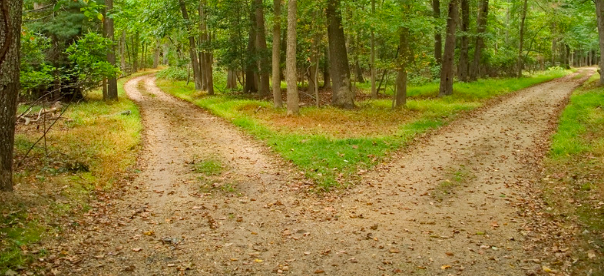It is common to think of prophets as seers who predict the future – like television preachers unlocking hidden biblical codes that reveal specific dates of pending catastrophes. Biblical prophets do not predict what will happen so much as paint pictures of possible futures that depend in large part on how human beings respond to God’s call in the present – they are actually more concerned about what is happening now than in the future. And if you read these prophets closely, you will discover, hidden in plain sight, distinctly ecological voices and visions that offer prophetic wisdom for us today. Here are four themes to look for.

Theme 1: Human Actions Ripple Through Creation
I wrote in my last post that many of the laws and statutes recorded in the Law focus directly on human care for animals and land – it is not hard to see that failure to follow these instructions would lead to a languishing world. But the prophets sometimes go even deeper, declaring that the very essence of creation can be shaken by human action. Jeremiah 4:22-25 captures God’s frustration with the people’s foolish choices and overall ignorance.
For my people are foolish,
they do not know me;
they are stupid children,
they have no understanding.
They are skilled in doing evil,
but do not know how to do good.
Verse 26 describes the consequences of this foolishness in a vision that is clearly the undoing of Genesis 1.
I looked on the earth, and lo, it was waste and void;
and to the heavens, and they had no light.
Like modern ecologists, the prophets understood how thoroughly connected humans are with the world. They also saw this connection through theological lenses - God had called the people to represent God and further God’s purposes for creation. When they did not do this well, the world around them suffered. Take, for instance, Isaiah 24:4-5, which reads as if it could be written today.
The earth dries up and withers,
the world languishes and withers;
the heavens languish together with the earth.
The earth lies polluted
under its inhabitants;
for they have transgressed laws,
violated the statutes,
broken the everlasting covenant.
The prophets also highlight the positive ecological consequences that occur when humans fulfill their calling and act in ways consistent with God’s intentions. Take this passage from Joel 2:21-24, which describes the regenerative results that come from Israel’s repentance.
Do not fear, O soil;
be glad and rejoice,
for the Lord has done great things!
Do not fear, you animals of the field,
for the pastures of the wilderness are green;
the tree bears its fruit,
the fig tree and vine give their full yield.
O children of Zion, be glad
and rejoice in the Lord your God;
for he has given the early rain for your vindication,
he has poured down for you abundant rain,
the early and the later rain, as before.
The threshing floors shall be full of grain,
the vats shall overflow with wine and oil.

Theme 2: Creation Mourns When It Does Not Flourish
Another theme that emerges is the way the prophets hear the voice of suffering in a comprehensive way. Notice in this passage from Joel 1:9-10, 18 that the writer has no qualms about connecting the mourning of the priests with that of the land and the animals that depend on the land.
The priests mourn,
the ministers of the Lord.
The fields are devastated,
the ground mourns;
for the grain is destroyed,
the wine dries up,
the oil fails...
...How the animals groan!
The herds of cattle wander about
because there is no pasture for them;
even the flocks of sheep are dazed.
The prophet Hosea (4:1-3) links the land’s mourning directly to what is happening in the human sphere and, like Jeremiah 4, makes direct connections to the original act of creation in his reference to the “birds of the air” and “fish of the sea” (see also Jeremiah 12:4).
Hear the word of the Lord, O people of Israel;
for the Lord has an indictment against the inhabitants of the land.
There is no faithfulness or loyalty,
and no knowledge of God in the land.
Swearing, lying, and murder,
and stealing and adultery break out;
bloodshed follows bloodshed.
Therefore the land mourns,
and all who live in it languish;
together with the wild animals
and the birds of the air,
even the fish of the sea are perishing.

Theme 3: The Future is Both Open and Decided
Prophets generally speak of the future as open – Israel and the surrounding nations can still repent. God is gracious and full of mercy. Impending doom can turn into renewal. The following text from 2 Chronicles 7:13-14 is a good example:
When I shut up the heavens so that there is no rain, or command locusts to devour the land or send a plague among my people, if my people, who are called by my name, will humble themselves and pray and seek my face and turn from their wicked ways, then I will hear from heaven, and I will forgive their sin and will heal their land.
It is an example of conditional blessing – if the people repent, then forgiveness and healing will come. The future, at least for the moment, is decidedly open.
But there are also texts that remind people that the future is ultimately in God's hands, and here the prophets highlight God's unconditional promise to make both people and places whole – like this vision from Isaiah 51:3:
For the Lord will comfort Zion;
he will comfort all her waste places,
and will make her wilderness like Eden,
her desert like the garden of the Lord;
joy and gladness will be found in her,
thanksgiving and the voice of song.
It is these promises that help us see the prophets' vision of salvation.

Theme 4: Salvation is Creation Healed
When the prophets speak of the future in ultimate terms, it is always the unconditional promise of God’s healing that wins out. And this healing is comprehensive – it is God’s promise to “create new heavens and a new earth” (Isaiah 65:17). This is not a completely new creation, as if God was starting from scratch, but a renewed world free of suffering and sin, ready to reach its God-given potential. An extended vision of this can be found in Isaiah 11:6-9, a text often recited during Advent and Christmas. Notice how the prophet’s vision of peace includes wild and domesticated animals, as well as humans; it is the whole earth that knows the Lord.
The wolf will live with the lamb,
the leopard will lie down with the goat,
the calf and the lion and the yearling together;
and a little child will lead them.
The cow will feed with the bear,
their young will lie down together,
and the lion will eat straw like the ox.
The infant will play near the cobra’s den,
and the young child will put its hand into the viper’s nest.
They will neither harm nor destroy
on all my holy mountain,
for the earth will be filled with the knowledge of the Lord
as the waters cover the sea.
Who are our prophets today?
There are lots of voices claiming to speak for God – it can be hard to know who to listen to. I tend to look for people who are unafraid to describe the failures of our collective worldview and way of life, and who call us to a new path. They understand God’s concern and care for the whole world, and do their best to show people the way toward more faithful and just living. I think of people like Katherine Hayhoe, a climate scientist and evangelical Christian working hard to help skeptics see the reality of our actions and change their beliefs and actions. I think of Randy Woodley, Native American follower of Jesus, who is helping people see the errors within Western cultural frameworks and the wisdom of indigenous traditions. I think of all the young people calling their elders to account for the world they are handing on to them. Who do you think we should be listening to? Feel free to let me know at james.amadon@circlewood.online.
Finding your prophetic voice
Not everyone is called to be a prophet, but everyone can have a prophetic voice. This happens when we tell the truth to those who need to hear it. We do not need to preach fire and brimstone – oftentimes the most effective word is delivered with grace and humility. You do not need to have a platform, or professional training, or a perfectly lived life. Be yourself. Listen to God and the world around you. Hear the voices of mourning. See the possibilities of peace. Watch for the hope that is always at hand. Then speak. You may be surprised who listens.
With you on the Way,
James
If you have additional observations, ideas or questions about this post, feel free to add a comment or email me directly at james.amadon@circlewood.online.
________________________________________________________
